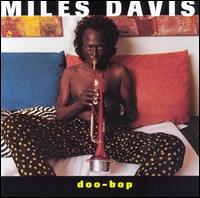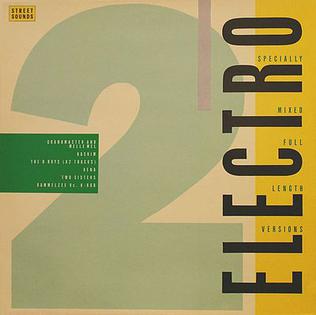Old-school hip hop is the earliest commercially recorded hip hop music. It typically refers to music created around 1979. Old-school hip hop is said to have ended around 1984, due to changes in both rapping technique and the accompanying music and rhythms.
Jazz rap is a fusion of jazz and hip hop music that developed in the late 1980s and early 1990s. AllMusic writes that the genre "was an attempt to fuse African-American music of the past with a newly dominant form of the present, paying tribute to and reinvigorating the former while expanding the horizons of the latter." The rhythm was rooted in hip hop over which were placed repetitive phrases of jazz instrumentation: trumpet, double bass, etc. Bands involved in the formation of jazz rap included A Tribe Called Quest, Digable Planets, De La Soul, Gang Starr, Jungle Brothers, and Dream Warriors.
Electro is a genre of electronic music and early hip hop directly influenced by the use of the Roland TR-808 drum machines, and funk. Records in the genre typically feature drum machines and heavy electronic sounds, usually without vocals, although if vocals are present they are delivered in a deadpan manner, often through electronic distortion such as vocoding and talkboxing. This is the main distinction between electro and previously prominent genres such as disco, in which the electronic sound was only part of the instrumentation. It also palpably deviates from its predecessor boogie for being less vocal-oriented and more focused on electronic beats produced by drum machines.
Manuel Joseph "Man" Parrish is an American composer, songwriter, vocalist and producer. He, along with artists such as Yellow Magic Orchestra, Kraftwerk, Art of Noise, Arthur Baker, Afrika Bambaataa, John Robie, Jellybean Benitez, Lotti Golden, Richard Scher and Aldo Marin, helped create and define electro in the early 1980s.

Doo-Bop is the last studio album by American jazz trumpeter Miles Davis. It was recorded with hip hop producer Easy Mo Bee and released posthumously on June 30, 1992, by Warner Bros. Records. The album was received unfavorably by most critics, although it won a Grammy Award for Best R&B Instrumental Performance the following year.

Kamaal the Abstract is the third studio album by American hip hop artist Q-Tip, released September 15, 2009, on Battery Records. Recorded in 2001, the album is a departure from his solo debut album Amplified (1999). Kamaal the Abstract is an eclectic album that features Q-Tip rapping, singing, and exploring his jazz influences. The album contains introspective and life-related lyrical themes.

The Third Unheard: Connecticut Hip Hop 1979–1983 is a compilation of old school Hip Hop music from Connecticut, a place not generally known for its rap music scene.

Fat Boys is the self-titled first studio album by hip hop group The Fat Boys on May 29, 1984 by Sutra Records. Album was produced by rap legend Kurtis Blow. LP is dedicated to the memory of Rebecca Wimbely and William (Divine) Santos. Album peaked at number 48 on the US Billboard 200, and number 6 on the Top R&B/Hip Hop Albums chart. The album was certified Gold by the RIAA on May 6, 1985.

That's My Beat is a compilation album by hip hop–electro funk musician, Kurtis Mantronik and features tracks selected by Mantronik and cited as influences to his work with his hip hop/electro funk group Mantronix. The album was released on the Soul Jazz Records label in 2002.

"Planet Rock" is a 1982 song by Afrika Bambaataa & the Soulsonic Force. The song featured Marvella Murray, Yvette Murray, Melissa Johnson and Sandra Wheeler on additional background vocals. Although it was primarily an underground hit in the United States, Canada, and UK, it helped change the foundations of hip-hop and dance music and became one of the most influential pieces and a milestone and eventually an icon of the hip-hop, breakdance and electronic music cultures. It is credited with pioneering the genre and developing the electro style, building on the work of Kraftwerk, Yellow Magic Orchestra, and George Clinton, combined with distinctive Roland TR-808 beats, and helped pave the way for other genres such as techno, house and trance. In November 2004, "Planet Rock" placed at number 240 on Rolling Stone's list of the 500 Greatest Songs of All Time and number 10 in About.com's Top 100 Rap Songs. "Planet Rock" peaked at number four on the soul chart and number forty-eight on the Hot 100, and went to number three on the dance charts.
A boombox is a portable stereo.

Hip hop music, also called hip-hop or rap music, is a music genre developed in the United States by inner-city African Americans in the late 1970s which consists of a stylized rhythmic music that commonly accompanies rapping, a rhythmic and rhyming speech that is chanted. It developed as part of hip hop culture, a subculture defined by four key stylistic elements: MCing/rapping, DJing/scratching with turntables, break dancing, and graffiti writing. Other elements include sampling beats or bass lines from records, and rhythmic beatboxing. While often used to refer solely to rapping, "hip hop" more properly denotes the practice of the entire subculture. The term hip hop music is sometimes used synonymously with the term rap music, though rapping is not a required component of hip hop music; the genre may also incorporate other elements of hip hop culture, including DJing, turntablism, scratching, beatboxing, and instrumental tracks.

[e] is a Korean hip-hop group Epik High's sixth official album released in September 2009 and is also their third major album release of the same year. The two other albums released in 2009 are Map the Soul and Remixing the Human Soul, an electronica-inspired remix compilation album with labelmates Planet Shiver. Like Map the Soul before it, [e] includes a complimentary mini-book along with the actual audio CDs. The 74 page mini-book contains song lyrics, interviews, photographs, and various production notes from the artists themselves.

Street Sounds Electro 2 is the second compilation album in a series released 1983 on the StreetSounds label. The album was released on LP and cassette and contains seven electro music and old school hip hop tracks mixed by Herbie Laidley.
"Sucker M.C.'s" is a song by American hip hop group Run–D.M.C. It was first released in 1983 on a cassette as B-side to "It's like That". The two-sided release marked the start of Run-D.M.C.'s career as their first single, and it is widely regarded as ushering in a new school of hip hop artists with a street image and an abrasive, minimalist sound that marked them out from their predecessors. Both tracks were collected on the trio's eponymous debut album in 1984. WBAU was the first station to play the two songs.

Ego Trip's The Big Playback is a 2000 compilation album released by the American record label Rawkus Records on April 11 2000. The album was released with the collaboration of the writers for Ego Trip magazine and made as a companion piece for Ego Trip's Book of Rap Lists. The album consists of rare and obscure tracks by hip hop artists and groups made between 1983 and 1989.











